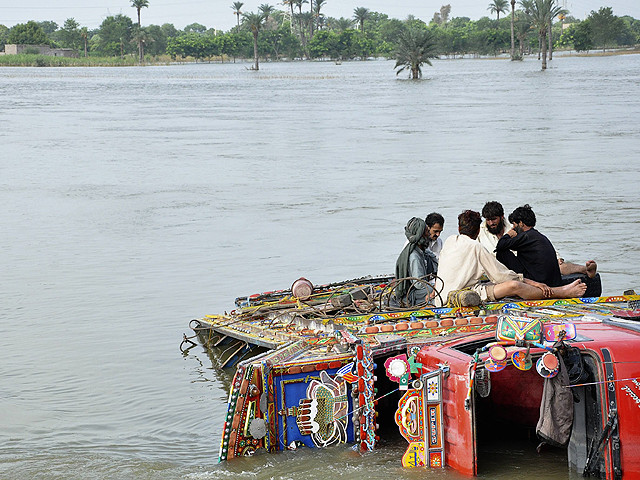Muzaffargarh oil spill threatens environment
Raging floodwaters washed away thousands of tons of oil and chemical stored in the district’s three major oil depots.

According to data gathered from a district official, there are three big oil storage facilities located in the district. PSO’s Mehmood Kot depot is the main source of supply for diesel, kerosene and lubricants to all the bulk supply depots in Punjab and Khyber-Pakhtunkhwa. Lalpir depot is the other facility with a capacity to stock 61,000 tons of fuel oil and 9,000 tons of diesel oil. It feeds Kot Addu Power Station and AES Lalpir Power Generation. Parco, the nation’s largest oil refinery, also maintains a big storage facility in Muzaffargarh, supplying petrol, diesel, kerosene and lubricants across the country. The official said the refinery also stocked a large quantity of different types of chemicals in its storage tanks.
According to the district administration, heavy floodwaters have damaged these storage sites, with the result that thousands of tons of oil spilled and dispersed over a 100-kilometre area. This has also affected 0.5 million acres of crops.
The official said that floodwaters mixed with oil have reached near the River Chenab and after mingling with that water will blend with that of Indus River before falling into the Arabian Sea.
Dr AR Saleemi, dean of chemical science at the University of Engineering and Technology (UET), says the floodwaters containing oil will pollute the entire area coming in its path.
He told The Express Tribune that sunlight could not penetrate the oil surface which means agriculture, aquatic life and the area’s flora and fauna will get affected.
He said that if oil-mixed water was not dispersed from the district or evaporated, then the cultivated lands of the area would become barren.
Environmentalist Akhter H Awan told The Express Tribune about the impact of oil spill and its dispersion with floodwaters. He said that when oil is spilled or leaked into waterways, it spreads very quickly with the help of wind and currents.
“A single gallon of oil can create an oil slick up to a couple of acres in length,” he said, adding that oil spill from the storage depots might spread over miles and miles in just three days.
He said that when oil starts mixing with water, it changes composition and becomes mousse, a sticky substance that clings even more to whatever it comes in contact with. He said that many animals, reptiles, and birds do not know how to avoid a slick and some may even be attracted to it as it resembles food.
“Even when the oil appears to have dissipated, it can still lurk beneath the surface of land, severely affecting organisms that burrow for decades,” he added. He said that these burrowing creatures are also food for other animals, so the cycle of poisoning continues for many years.
He said that the closer the spill occurred to the land waterways the more pronounced the damage will be due to agricultural fields being home to more concentrated and diverse populations of reptiles, bird and animal life.
He said that oil penetrates up the structure of the plumage of birds, reducing its insulating ability, and so making the birds more vulnerable to temperature fluctuations and much less buoyant in the water.
He said that birds typically ingest oil that covers their feathers, causing kidney damage, altered liver function, and digestive tract irritation.
“Most birds affected by an oil spill die unless there is human intervention,” he added. Marine mammals exposed to oil spills are affected in similar ways as seabirds.
Because oil floats on top of water, less sunlight penetrates into the water, limiting the photosynthesis of marine plants and phytoplankton which also affects the food chain in the ecosystem.
He said that despite all the above-mentioned effects, the soil contamination shall cause huge loss which shall adversely affect the crops and their chemical structures for many years ahead. “The vulnerable peasants shall suffer from skin diseases, bronchitis, lungs, and kidney problems,” he added.
Published in The Express Tribune, August 23rd, 2010.


















COMMENTS
Comments are moderated and generally will be posted if they are on-topic and not abusive.
For more information, please see our Comments FAQ